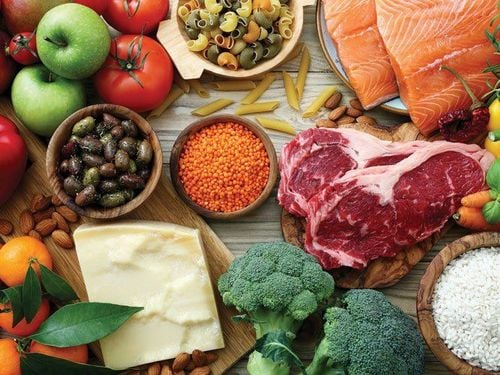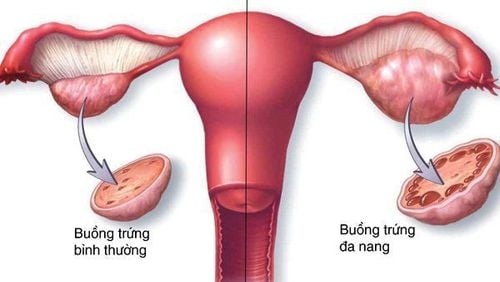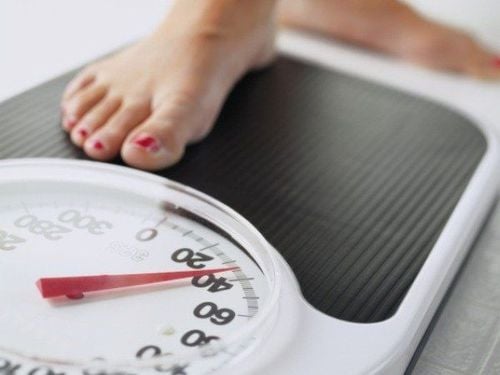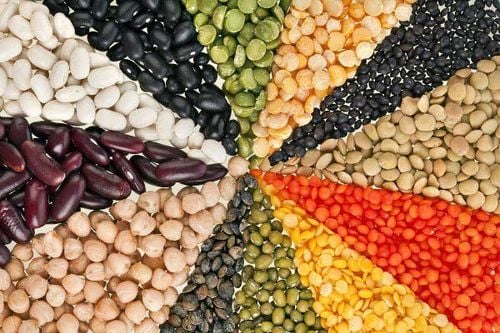This is an automatically translated article.
Polycystic ovary syndrome (PCOS) is a common health condition that affects 1 in 10 women of childbearing age. PCOS can also lead to health problems, such as diabetes, heart problems, depression, and an increased risk of endometrial cancer. Several studies have shown that diet can help reduce the effects of PCOS. So, when you have polycystic ovaries, what should you eat? will be presented in this article.
1. How does diet affect PCOS?
Vegan meal with chickpeas, quinoa, sweet potatoes, avocado, lemon, high fiber vegetables and beans is a diet that includes high fiber foods that may be beneficial for people with ovarian syndrome PCOS polycystic eggs.
Two of the main ways that diet affects PCOS are weight management, insulin production and resistance. However, insulin plays an important role in PCOS, so managing insulin levels with the PCOS diet is one of the best steps people can take to keep the condition under control.
Women with PCOS are often found to have higher than normal blood insulin levels. Insulin is a hormone produced in your pancreas. Furthermore, insulin helps the cells in your body turn sugar (glucose) into energy. If your body doesn't produce enough insulin, your blood sugar can rise. This can also happen if you are insulin resistant, meaning you cannot effectively use the insulin you produce. If your body is insulin resistant, your body may try to pump out high amounts of insulin to try to keep your blood sugar in the normal range. Higher-than-normal insulin levels can cause the ovaries to produce more androgens, such as testosterone.

Các thực phẩm giàu chất xơ có thể có lợi cho những người bị hội chứng buồng trứng đa nang PCOS
Insulin resistance can also be caused by an above-normal body mass index. Even being insulin resistant can make it harder to lose weight, which is why women with PCOS often have this problem.
Following a healthy diet that helps meet nutritional needs to maintain a healthy weight and promote good insulin levels can help people with PCOS feel better.
2. Foods that should be consumed by people with PCOS
Research has found that what people eat has a significant effect on PCOS. So, what should people with polycystic ovaries eat? It is possible that this object does not have a standard diet. However, there is widespread agreement about which foods are beneficial and seem to help people manage their condition, and which foods to avoid.
Three diets that can help people with PCOS manage their symptoms are:
Low glycemic index (GI) diet: The body digests low GI foods more slowly, which means they don't cause insulin levels to rise as quickly or as much as other foods, such as certain carbohydrates. Foods in a low GI diet include whole grains, legumes, nuts, seeds, fruits, starchy vegetables, and other unprocessed, low-carbohydrate foods. Anti-inflammatory diet: Anti-inflammatory foods, such as berries, fatty fish, green vegetables, and extra virgin olive oil, can reduce symptoms associated with inflammation, such as fatigue.
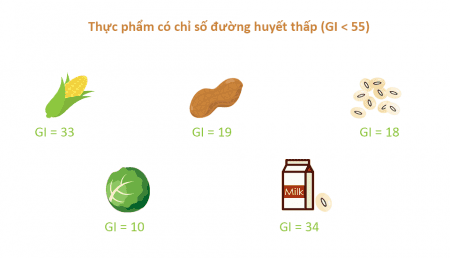
Chế độ ăn có chỉ số đường huyết (GI) thấp có thể giúp những người bị PCOS kiểm soát các triệu chứng của mình
DASH diet: Doctors often recommend the Dietary Approaches to Stop Hypertension (DASH) diet to reduce the risk or impact of heart disease. It can also help manage PCOS symptoms. The DASH diet is high in fish, poultry, fruits, vegetables, whole grains, and low-fat dairy products. The diet discourages foods high in saturated fat and sugar. One study found that obese women who followed a specially designed DASH diet for 8 weeks experienced a reduction in insulin resistance and belly fat compared to those who did not follow the same diet.
A healthy PCOS diet can also include the following foods:
Natural, unprocessed foods High fiber foods Fatty fish including: salmon, tuna, mackerel and sardines dark green leafy vegetables: kale, spinach and other dark green leafy vegetables Dark red fruits, such as red grapes, blueberries, raspberries and cherries Broccoli and cauliflower white Legumes include: dried beans, lentils and other legumes Healthful fats, such as olive oil, as well as avocado and coconut
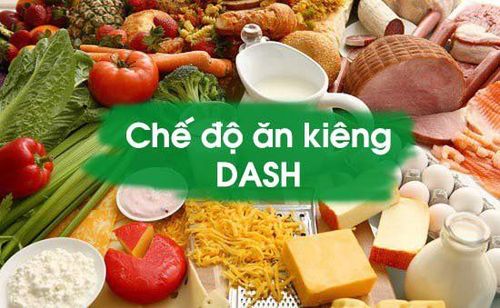
Đối với những phụ nữ béo phì thực hiện chế độ ăn kiêng DASH có thể giảm được tình trạng kháng insulin và mỡ bụng
Nuts like pine nuts, walnuts, pistachios and almonds Moderate dark chocolate Spices, such as turmeric and cinnamon Researchers looking at a variety of healthy diet plans found See the following minor differences. Example:
Individuals lose more weight with a diet that emphasizes monounsaturated fats instead of saturated fats. An example of this diet is the anti-inflammatory diet, which encourages people to eat plant-based fats, such as olives and other vegetable oils. People who followed a low-carbohydrate or low-GI diet had improved insulin metabolism and lowered cholesterol levels. People with PCOS who followed a low GI diet also reported a better quality of life and more regular menstrual periods. Overall, studies have found that losing weight helps women with PCOS, regardless of what diet they follow.
3. Foods to avoid for people with PCOS
In addition to the above analysis, what should people with polycystic ovaries avoid? for a healthy diet. In general, people following the PCOS diet should avoid foods that have been widely considered unhealthy. Includes:
Soda or coca cola in a glass with ice. People following the PCOS diet should avoid sugary drinks. Refined carbs, such as mass-produced pastries and white bread. Fried foods with a lot of oil, such as fast food. Sugary drinks, such as soft drinks and energy drinks. Processed meats, such as hot dogs, hot dogs, and lunch meats. Solid fats, including margarine, lard and lard. Excess red meat, such as steaks, burgers, and pork.
4. Lifestyle changes

Chế độ ăn kiêng PCOS với hoạt động thể chất có thể giảm cân cải thiện chuyển hóa insulin
Lifestyle changes can also help people with PCOS manage the condition. Research has shown that combining the PCOS diet with physical activity can lead to the following benefits: weight loss improves insulin metabolism, more regular periods, reduced levels of male hormones, and hair growth. in men lower cholesterol levels. Studies have also found that behavioral strategies can help women achieve their weight management goals, thereby helping to manage PCOS symptoms. These practices include: goal setting social support network techniques self-monitoring psychological health care. Reducing stress through self-care practices, such as getting enough sleep, avoiding overcommitment, and taking time to relax, can also help a person manage PCOS.
Although there is currently no cure for PCOS, a person can reduce symptoms and improve quality of life by adopting a healthy diet and becoming more active. Achieving and maintaining a healthy weight, while eating healthy fats, lean protein, and moderate amounts of low GI carbohydrates can help a person control PCOS.
Any questions that need to be answered by a specialist doctor as well as customers wishing to be examined and treated at Vinmec International General Hospital, please contact the Website for the best service.
Please dial HOTLINE for more information or register for an appointment HERE. Download MyVinmec app to make appointments faster and to manage your bookings easily.
References: medicalnewstoday.com, healthline.com





